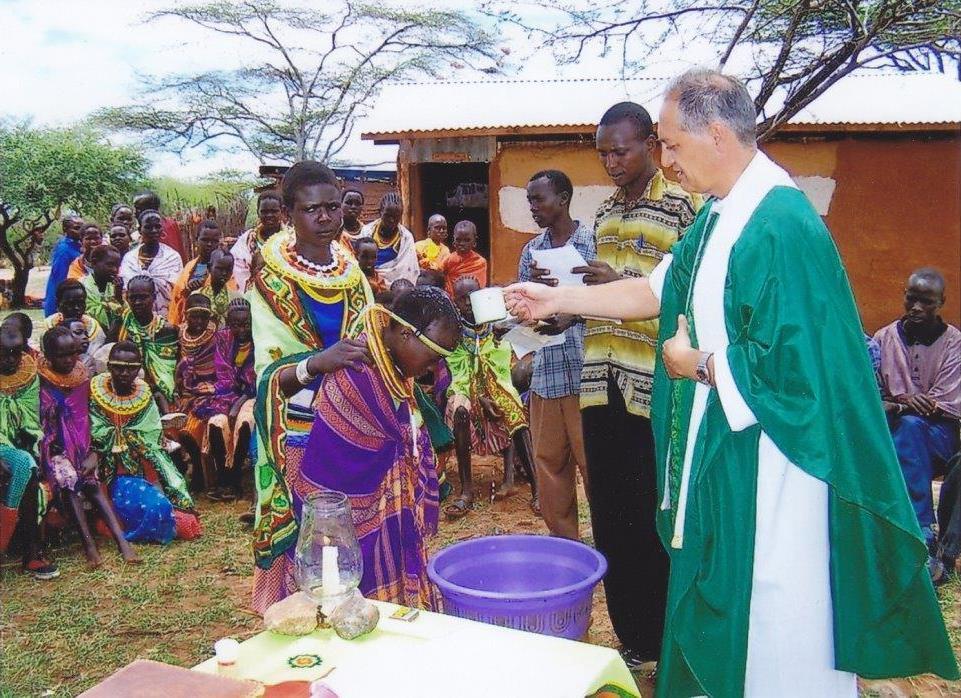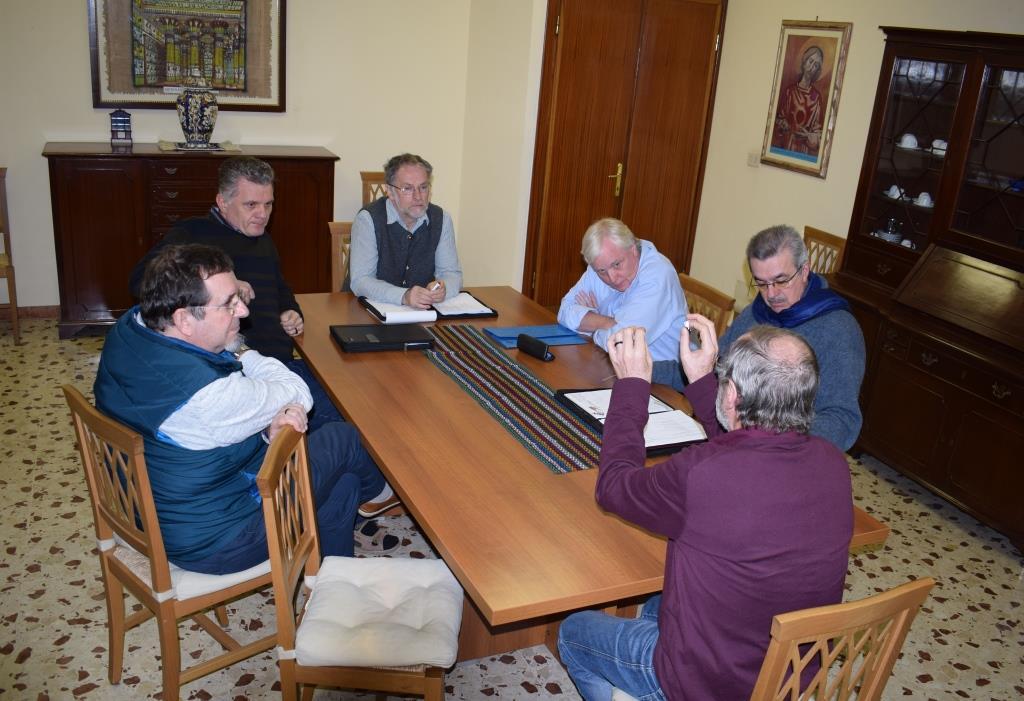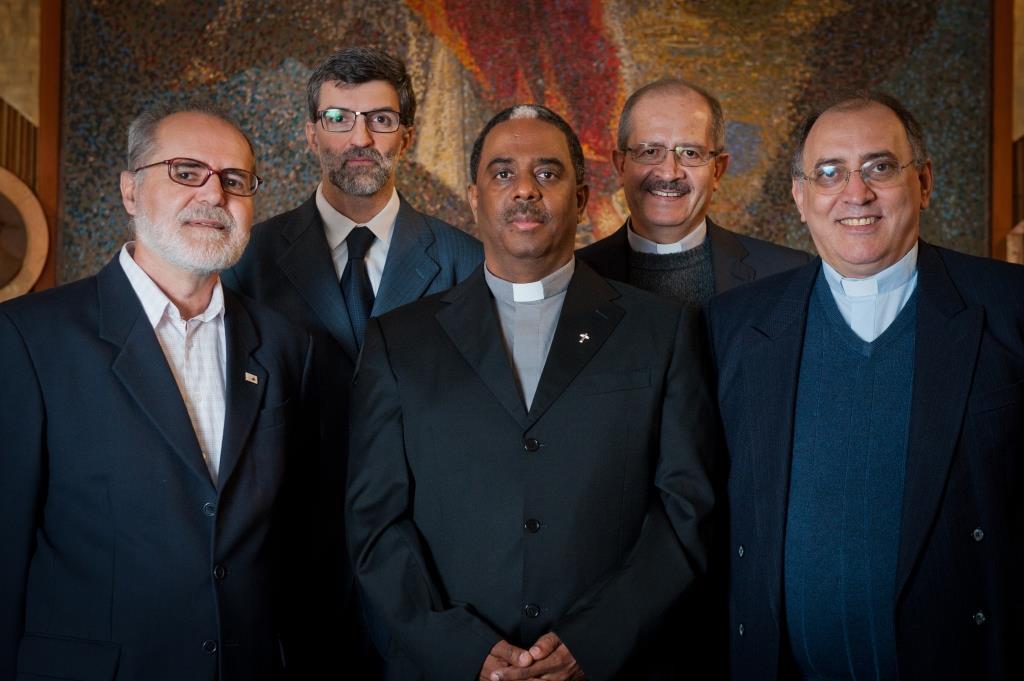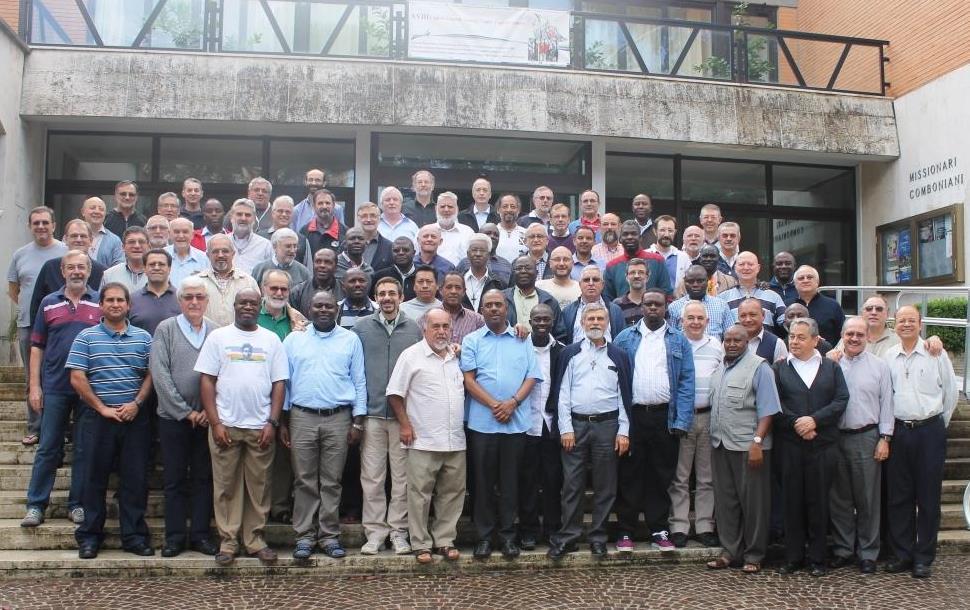Daniele Comboni
Missionari Comboniani
Area istituzionale
Altri link
Newsletter
Saturday, September 26, 2015
Every Six year we are called to get involved in a process of discernment that calls all of us to be deep communion with the Holy Spirit in order to take steps forward in the fulfilment of the vocation to which the Lord has called as Comboni missionaries. I am aware that a General Chapter is going on, and that next year there will occur the circumstance of election, yet, I do not write to influence anybody, but rather as an exercise of clarification for older generations and of instruction for the young generations about how to take part in the exercise of election. The insights of this writing have been in my computer since years back; but only now I find the time to organize them together. [By Fr. Tomás Herreros Baroja, in the picture, in Kenya].
Fr. Tomás H. Baraja,
Comboni missionary.
In the months after the election of Pope Francis, magazines published an interview done by Antonio Spadaro SJ, much known by everybody. In this interview Jorge Mario Bergoglio opened his mind and was very candid about his vision of Church, priests and his own person. He mentioned that an important element of discernment in the Ignatian Spiritual Exercises is when the person manages to recognize himself/herself a sinner. Not just any sinner, but a person that accepts his sins, mistakes and weaknesses. A person that asks himself: What have I done for Christ; What am I doing for Christ now; What else can I do for Christ.
When we ask ourselves those questions, we prove that there is a process of conversion going on in us. That means that from that point onward, the person starts to avail himself to the Kingdom of God. We know that to acquire the conscience of sinners means to accept our failures, and acknowledge how we did not fulfil our promises and pledges.
Discernment is an important tool in the Ignatian spirituality and a paramount element in out system of formation, and it should be a more compelling tool in our decision making. Discernment is not just an intellectual exercise, it leads towards conclusions, and those conclusions should be practical and possible, not just plausible -often our decisions become wishful thinking-.
In the interview the Pope confesses that when he was given the task of leading his Province in Argentina he was “young” (36 years old), and “could not avoid making mistakes because he faced situations that, at that moment, were above his possibilities.” What a humility!! And accepted that some of those decisions were not adequate for the critical circumstances in which they lived under the military dictatorship of the time. It takes courage to acknowledge past mistakes that, all the same, had tragic consequences; but right now is the water that has gone down bridge and there is nothing that can be done to undo the errors.
Encouraged by the sincerity of Francis, I reflected on our process of discernment and I realized that even if we say that superiors had the responsibility of taking decisions, the fact is that we all are involved in the decision making, a process that starts long before our leaders decide on concrete matters, because we are the ones who elect our superiors (Never mind the term used: superior, leader, responsible, administrator, etc. The concept implies “authority”, which means the capacity for deciding and possibility of enforcing decisions.) Our superiors have the mandate to decide in fidelity to the Charism. They might impose decisions, but the best leadership they can exert is the one that inspires, proposes, attracts (Cf. RL 35.5; 106,107).
The practice of Consecrated Life is that authority is exerted by people who have been elected by the members of the circumscription they are to lead. This means, all confreres have an important role in exercising authority. In today’s politics that kind of governance is called democracy, in the church we prefer the name “synodal”. It comes to imply that the visions and opinions of the majority set the direction of helm which steers the ship of the congregation. Majority decides the evolution of the Charism (we are suppose to be faithful to the charism and at the same time we need to adapt it to the times and needs). Documents from the magisterium of the church, texts from theologians and missiologists, the witness of holy people and prophets influence our minds, but they do not decide.
Generally, the synodal decision making is not prophetic, neither magisterial, nor authoritarian. Prophetic governance rules by inspiration and personal attraction. Magisterial governance rules by instructions which are accepted on respect of the one who decides, because he knows better (and this does not mean he knows all). Synodal governance rules by consensus. Authoritarian governance rules by discerning and enforcing the policies and regulations accepted by the group (just the way judges act in Courts of Law).
The members of the synod have been delegated by those who elected them. Therefore, before we engage ourselves in the process of choosing we need to examine properly the health of our identity with the charism to which the Spirit of God called us into, in our case the Charism of St. Daniel Comboni. Just in the same way as P. Jorge Mario Vergoglio reflected on his past.
However, besides those criteria there are others which influence the way we cast our vote: fidelity to the charism of the person we vote, membership of my group, person of my like or my friend, someone of my generation, someone who did not or will not disturb me. So, we find, that we must reckon with five criteria: Fidelity, belonging, liking, identity and expedience (holiness, experience and character).
The vote is personal, private and confidential. Yet, in our tradition, in several instances we have tried to do a profound communitarian reflection trying to depict the ideal leader for the moment. Mentioning the characteristics of our superiors, ended up describing a super heroe, a saint of the kind that we rarely have. The exercise is loadable and at times needed. However, only if we become aware of the mechanisms that are conditioning my decisions we may end up choosing a person which will not lead, but rather be led by the opinion and ways of the majority, because when we try to agree by consensus the easiest way out is to accept the least demanding common denominator. In arithmetic the order of integers does not affect the result; but in the decision making process it does. Consider, when first criteria influencing my decision is a person with leadership qualities, or someone of my generation, or someone I like, etc.
At this point, if we try to enter into a genuine election process we need to recall the sincerity of Pope Francis and try to discover my personal failures regarding the fulfilment of the charism. We need to consider the elements that are challenging our circumscription and community. We need to accept the kind of relationship I have with the confreres who will be most likely chosen. We need to see the picture from afar, not to get lost in the details. In doing that shall embrace the whole landscape, the past and the future, and take decisions responsibly. This “we” implies all of us. Because of that I appeal to the concept of “corporate responsibility”.
Corporate responsibility
To sum up, let us say that a genuine process of election needs three steps: Purification of intentions, updating the charism, trust in the future.
1. Purification of intentions and cleansing of past errors
In doing this we see which is the health of our fidelity to the vocation the Lord entrusted to us and how faithful we have been to the charism. It is easy to recognize this getting in touch with my personal frustrations, my personal clashes with confreres, my personal unhappiness with the developments of the institutions, my complaints about how I have been treated by the institution and its leaders. In failing to do this the exercise of our right to vote can easily become a reprisal vote. That implies a step behind not a step forward.
Mistakes can be done by individuals and by the institution. We find easy to point the finger on people and try to excuse the modus operandi of the institution. Two examples on which I doubt we are being faithful to the Spirit: the deployment of young forces, the election of major superiors.
Deployment of young confreres
The term “young” has evolved since the time our Rule of Life was approved back in 1988 (though the most of its contents can be traced back to 1979). At that time, confreres were finishing their formation when they were 26 years of age. Nowadays, the average cold be 32 years old. At that time, few confreres reached the age of 80; nowadays there are many over 90. The mature generations of those years have grown with the understanding that missionaries were to be exposed to hardships (in climate, sickness, living conditions) and therefore missionaries had to be of strong health. The young still shared that understanding but the stress was towards sharing the lives of the poor and defending the rights of the downtrodden. All that could fit within the famous sentence “most poor and abandoned”.
Since then, medicines has done great strides, we live longer and recover better after sickness. The charismatic formula towards the poor and abandoned remains, though it has become confusing. Nonetheless, whichever is the understanding, it seems that the young should be courageous, enthusiastic, full of spiritual fervour, energetic. And therefore they fit better in the vanguard of our commitments. To the Spirit we owe the best of ourselves as institution. How to assist the institution to remain strong and at the same time to thrive on the vanguard of our ministry remains a challenge. Difficulties arise also because the young generations prior to 1968 proved to be more convinced of their permanent commitment to the Lord than those which came afterwards, regardless the cultural background.
The institution has the danger of becoming self-centred worried of its own survival. When that happens becomes barren, like the woman so concerned about the beauty of her body that forgets that body has the task of generating children. And by the time she wants to beget it has become too late.
Continuity in planning and leadership
We are used to personal acknowledgement of mistakes, but institutions find very hard to do that. Who is entitle to do it? In the books of Ezra and Esther we find acknowledgement of guilt which is done in first person plural indicating that the speaker includes him/herself among those that went astray. When recent popes have apologized for past mistakes they talk of the Church in third person, as though the issue would not touch them. In our case, I have no authority whatsoever to apologize on behalf of the Comboni missionaries, nonetheless it is my opinion that we have erred in the ways circumscriptions have tried to keep continuity in the plans of provinces and the whole congregation.
Exercises to compose the six year plans in continuity with the previous one run quite smoothly, but the election of major superiors and councils do not. At the provincial level I found laudable that most of provincial superiors are re-elected for their second term. However, some provinces prefer to change completely his counsellors. At the general level, I consider a mistake the practice of the last twenty five years of renewing completely the general administration (though secretaries have remained to give continuity). The complete overhaul could imply that they had finished the job well, or that they did not do it well. Altogether, I think that some changes were done because they had done controversial decisions that disliked the voters, not that the decisions were not valid or authentic.
At the time of electing superiors we try to find a convenient persons, as explained above, and yet we need to consider that the election should not disrupt the well functioning of other important positions in the institute and in the fields of works. Because, thanks be to God, we do have emblematic people whose presence and approach makes the difference. The fact that they do not become major superiors does not make them less valuable. Because of that I think that in our elections we should try not to disrupt ministries that are running well. At this respect, there have been many formators who have become major superiors, and ex provincials that have become formators, while the qualities to be a good formator differ from the ones of being a good provincial.
Appealing to “corporate responsibility”, we need to consider the age and experience of those in authority. Age does affect the perception of reality. And age enhances or limits our personal strengths. It is better to assign the youth to direct ministry rather than authority. Not because they do worse than the old, but because their qualities are of better use to fulfilment of the Charism in ministry.
As mentioned above, the age span for youthfulness and old age has changed, and cultural backgrounds of confreres do affect perceptions on the value of youth and maturity. The understanding of youthfulness has changed: it used to be maximum 25 years and married. Now is 35 years and single. Now the so called young confreres are around 40 years of age. We live longer than before, and our physical and mental capacities deteriorate much slower, therefore we need to administer those gifts from God with wisdom. The universal church gives us examples: Usually, bishops are consecrated between the age of 45 to 60; popes on ages above 70. Bishops resign at 75 (10 more than the pension age in western societies), and yet not all of those resignations are accepted at once, if the person is strong and does a good job.
2. Updating the charism to the present
Who is to do it?
The charism of Comboni evolves adapting itself to the times and the needs of the mission. The evolution is done the members of the institute. There is a practical evolution and a theoretical evolution. The theoretical appears in the public documents prepare by our leaders. The practical appears in the way we live the charism. The danger of creating a gap between the praxis and the theory is always there. The way to merge both is formation: basic and ongoing. Therein the relevance of confreres in charge of any activity of formation.
Formators are appointed by major superiors. Major superiors are chosen by all confreres. The Rule of Life specifies who have right for passive and active voice. All the same, I feel uncomfortable with the practice that confreres in temporal vows have active voice in the election of major superiors, reasons: understanding of the charism, identity with the charism, perseverance in the institute.
Understanding of the charism: Our basic formation is long. The assimilation of the values of the charism is not proportional to the duration of formation. The methodology followed in formation conditions the comprehension. And the attitude of the individual foster or hinders the deepening on the charism.
Identity with the charism: Candidates stay with us before they make first profession at least six years. It seems a long time to grow in the sense of belonging. However, is it long enough? Do our young confreres feel identified with the congregation? (identity also applies to all confreres, we have heard people saying “this is not the congregation on which I made vows”). On which values and persons do we base our identity? Is it rooted in the Lord and in Comboni first?
Perseverance: In the late nineties, when perseverance of confreres was feeble, I thought that perhaps it was risky to let confreres on temporal vows decide who were to be the leaders of the circumscriptions. I was questioning myself, whether five years of introduction to the Comboni charisma Comboni were enough to assimilate and appropriate its characteristics. I know that I was not the only one questioning the wisdom of the Rule of Life 119.1; 150; regarding the right to active vote of confreres immediately after the first profession. Was not better to wait till they had done their final profession? At least, during the four years in temporal vows the identity and understanding of the Comboni charism would have matured, just as it is explained in RL 97, thanks to life in community, prayer, study and ministry. Being involved in decision making is a sign of maturity. However, is it not risky for some circumscriptions with plenty of youth to depend so much on them. Of course, the enthusiasm of the youth is always there, but rate of perseverance in any kind of commitment today differs from the one on the eighties.
3. Trust in the future and new agents: Afirmative action
Back in 1978 when the Rule was written, the average age of making first vows was 19 years of age, now it is 26. At that time confreres on temporal vows 60% of the were Europeans, now they are 4 % (at the moment: 84% African, 4% European, 10% American). Those who wrote the Rule of Life were optimistic, the crisis of perseverance was there, but it was thought it would go through… because in previous generations, the 50’s and the 60´s were remaining.
In the exercise of appointing confreres suitable for key positions or electing major superiors, we try to consider personal capacities: ideal age, experience, energies, spirituality, character, expedience. We reckon the needs of the moment. And allow ourselves to be influenced by friendship and liking.
Quite often we chose someone whom we know did it well before and therefore we close the door to new talents who will be depraved of the chance to prove their capability. To break that tendency that shows fear, we need to apply “affirmative action”. The opposite also occurs, we chose someone who is new completely because we want to shake the institution towards a different direction, on the bases of trial and error. A religious congregation acting like that shows a certain level of desperation.
Nonetheless, I do think that we cannot be afraid of applying affirmative action because more often than not we are blinded by our own bias and old alliances. The way to destroy it is by giving opportunity of leadership to new confreres. Without affirmative action minorities hardly will pave their way to the top and their leadership qualities will never be exploited.
Conclusion
I do not think there is need of changing the rules for appointing and electing confreres to key positions in the congregation. We cannot put obstacles to the Holy Spirit. However, it will be beneficial for us all to be aware of mechanism that influence our decisions in order to be more free of them. We need to look on what is best for whole, not just for the particular. We know that not because a football team fixes the best scorers they will the game, because the forward players need the support of midfield and back players. So, it should be when we try to make our ministry more efficient and our fidelity to the charism more authentic.
Fr. Tomás Herreros Baroja





